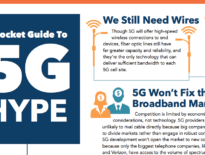Municipal broadband networks already serve more than 500 communities across the country, but some states are trying to keep that number from growing. Nineteen states have established legal barriers or even outright bans on publicly owned networks, according to well-respected communications law firm Baller Stokes & Lide.
These state laws, often enacted at the behest of large telecom monopolies, slow the development of community owned connectivity in various ways. From Alabama to Wisconsin, states have implemented everything from direct prohibitions on municipal networks to oppressive restrictions and requirements that limit competition.
The outlook for municipal connectivity may be starting to improve though, despite incorrect reports that state-level broadband preemption increased over the past year. Baller Stoke & Lide’s list of states with restrictions on municipal broadband investment actually shrunk this year from 20 states to 19 — a result of downgrading Colorado’s SB 152 from bonafide barrier to mere annoyance. Still, barriers to community networks remain in more than a third of all states, leaving millions of Americans unconnected and tens of millions more without local Internet choice.
Bans, Blocks, and Burdens
Common approaches to preempting municipal broadband networks range from straightforward bans to confusing financial restrictions and complicated legal requirements. While some states have established one main barrier to community broadband, many more have adopted a bird’s nest of regulations that kill any possibility of municipal connectivity, if only because of the legal uncertainty created by complex and vague laws.
Out of the 19 states with restrictions on municipal networks, a few explicitly ban local governments from providing communications services to their citizens. In Nevada, only municipalities with less than 25,000 people and counties with less than 55,000 people can offer telecommunications services. Both Arkansas and Tennessee bar municipalities without electric utilities from providing Internet access in most situations. Yet other states restrict where government utilities can deploy broadband or what types of services they can offer. Local governments in Missouri and Texas are limited to offering Internet access and no other telecommunications services. Montana and Pennsylvania state laws permit municipal networks, but only in unserved communities.
 In states that don’t expressly forbid municipal networks, state legislatures can still establish legal roadblocks that deter investment in community broadband networks. One of the strongest examples of this is North Carolina, where an array of burdensome restrictions and requirements “collectively have the practical effect of prohibiting public communications initiatives,” Baller Stokes & Lide explain.
In states that don’t expressly forbid municipal networks, state legislatures can still establish legal roadblocks that deter investment in community broadband networks. One of the strongest examples of this is North Carolina, where an array of burdensome restrictions and requirements “collectively have the practical effect of prohibiting public communications initiatives,” Baller Stokes & Lide explain.
These laws take a variety of forms. Some states, including Virginia, Florida, and South Carolina, require that municipal networks impute private sector costs, pay additional taxes, set excessively high prices, and/or refrain from subsidizing affordable service, in the name of protecting private “competition.” In other states, legislators have established stringent procedural requirements, including a prescribed bidding process in Michigan and community referenda in Alabama and Minnesota.
Restrictions in some states have forced local governments into choosing open access network models that may not be the most appropriate for their communities. For example, municipal networks in Utah are excluded from some of the state’s constraining laws if they sell only wholesale access, and Public Utility Districts in Washington are prohibited from offering retail broadband services. As a result, communities in both states are compelled to build open access networks regardless of whether that approach makes sense in the local market.
For more information on the specific laws in each of these states, view Baller Stokes & Lide’s summary.
BroadbandNow Incorrectly Inflates State Barriers
Many news outlets have erroneously reported that 26 states now preempt municipal broadband networks, based off unintentionally misleading research from BroadbandNow. Unlike Baller Stokes & Lide, which only considered the state laws that actively prevent local governments from investing in community networks, BroadbandNow cast a wider net in its report, inflating the number of states with laws that restrict municipal broadband networks. Most importantly, California, which is on BroadbandNow’s list but not Baller Stokes & Lide’s, removed it’s restriction on community owned networks in 2018. This is noted in BroadbandNow’s report, but California remains part of the total count that’s being cited by journalists, researchers, and policymakers.
 Other state laws identified by BroadbandNow either aren’t applicable to local governments or haven’t proven to be significant barriers to municipal investment. For instance, the Oregon law BroadbandNow listed concerns a specific statewide fiber network, not individual cities and counties. In Connecticut, the state utilities authority simply ruled that local governments don’t have free access to poles for broadband deployment like they do for public safety, a potential advantage that exists in no other state. And in the case of Wyoming and Massachusetts, the state legislatures only restricted the use of state broadband funds for municipal networks, which doesn’t prevent local governments from offering Internet access or using other financing methods.
Other state laws identified by BroadbandNow either aren’t applicable to local governments or haven’t proven to be significant barriers to municipal investment. For instance, the Oregon law BroadbandNow listed concerns a specific statewide fiber network, not individual cities and counties. In Connecticut, the state utilities authority simply ruled that local governments don’t have free access to poles for broadband deployment like they do for public safety, a potential advantage that exists in no other state. And in the case of Wyoming and Massachusetts, the state legislatures only restricted the use of state broadband funds for municipal networks, which doesn’t prevent local governments from offering Internet access or using other financing methods.
While Iowa cities must hold a referendum before developing any new municipal utility, the significant number of community networks in the state suggest the restriction isn’t currently a barrier to local investment. For a similar reason, Baller Stokes & Lide removed Colorado’s SB 152 from the list of state barriers. Colorado law still requires communities to vote to opt out of the state prohibition on municipal networks, but already more than 140 cities and counties have successfully reclaimed local authority, proving that this relatively minor hurdle should not be confused with laws in other states that more strongly limit competition.
To be clear: much of this legislation is unnecessary and serves little purpose other than to please large telecom monopolies like Comcast and AT&T. But labeling these laws “municipal broadband roadblocks” mischaracterizes their actual impact on local governments and could even discourage communities from pursuing a publicly owned broadband solution in a state where the legal stipulations can be overcome.
For a more in depth discussion on the differences between Baller Stoke & Lide’s and BroadbandNow’s assessments of state broadband preemption, listen to episode 368 of the Community Broadband Bits podcast.
State Preemption Stalemate
In contrast to sensationalist reports of growing state preemption, the 2019 legislative session was actually more of a detente rather than a call to arms for municipal broadband networks and state legislatures. No states passed new laws to restrict community owned connectivity, and at least one state, Arkansas, even loosened its ban on some municipal networks.
While it’s unclear whether this is a turning point in the fight for local authority or just the calm before the storm, laws in 19 states still prevent local governments from investing in municipal broadband networks. Legislators in those states should remove these legal barriers if they truly want all of their constituents to have a choice in modern, high-speed Internet access.
Photo credit pasja1000 via Pixabay.
This article was originally published on ILSR’s MuniNetworks.org. Read the original here.





